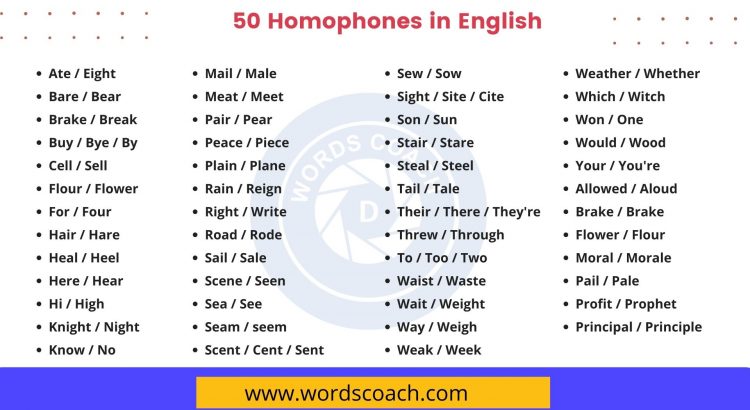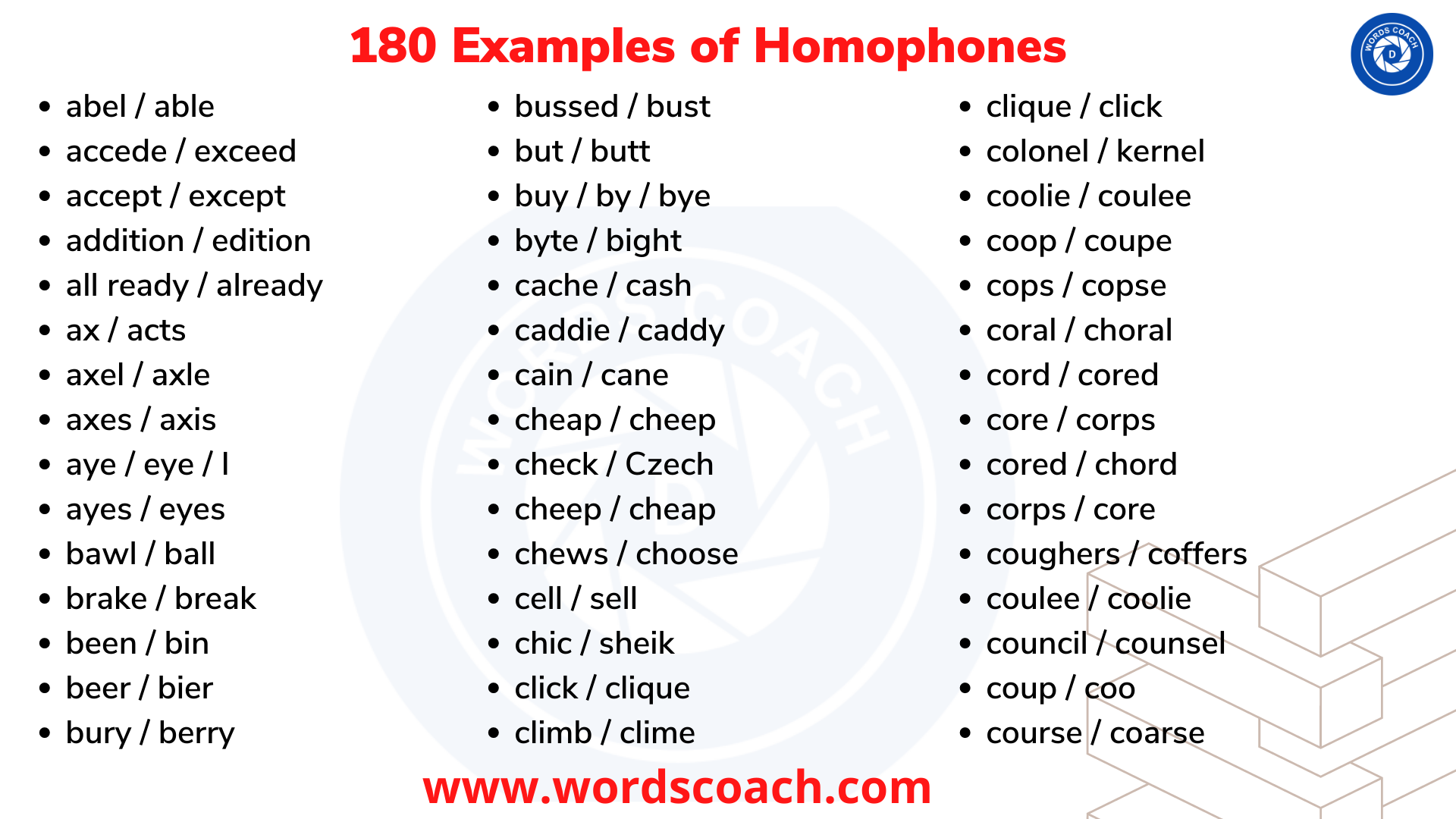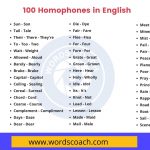50 Homophones in English
Homophones are words that sound the same but have different meanings and spellings. They can be challenging to understand and differentiate, especially for non-native English speakers. However, mastering homophones is essential for clear communication and effective writing.
Homophones list
Here are 50 Homophones in English.
- Ate / Eight
- Bare / Bear
- Brake / Break
- Buy / Bye / By
- Cell / Sell
- Flour / Flower
- For / Four
- Hair / Hare
- Heal / Heel
- Here / Hear
- Hi / High
- Knight / Night
- Know / No
- Mail / Male
- Meat / Meet
- Pair / Pear
- Peace / Piece
- Plain / Plane
- Rain / Reign
- Right / Write
- Road / Rode
- Sail / Sale
- Scene / Seen
- Sea / See
- Seam / seem
- Scent / Cent / Sent
- Sew / Sow
- Sight / Site / Cite
- Son / Sun
- Stair / Stare
- Steal / Steel
- Tail / Tale
- Their / There / They’re
- Threw / Through
- To / Too / Two
- Waist / Waste
- Wait / Weight
- Way / Weigh
- Weak / Week
- Weather / Whether
- Which / Witch
- Won / One
- Would / Wood
- Your / You’re
- Allowed / Aloud
- Brake / Brake
- Flower / Flour
- Moral / Morale
- Pail / Pale
- Profit / Prophet
- Principal / Principle
list of Homophones with meaning and sentences
Ate / Eight:
- Ate: Past tense of the verb “eat.”
- Example: She ate a delicious meal for dinner last night.
- Eight: The number 8.
- Example: There are eight planets in our solar system.
Bare / Bear:
- Bare: Without covering or clothing; naked.
- Example: The tree branches were bare in the winter.
- Bear: A large mammal with fur.
- Example: We saw a grizzly bear in the forest.
Brake / Break:
- Brake: A device used to slow or stop a vehicle.
- Example: Apply the brake gently to stop the car smoothly.
- Break: To separate into pieces or parts.
- Example: Don’t break the glass; it’s fragile.
Buy / Bye / By:
- Buy: To purchase something.
- Example: I need to buy groceries from the store.
- Bye: A farewell.
- Example: She waved goodbye and said, “Bye!”
- By: Next to or near.
- Example: She sat by the window to enjoy the view.
Cell / Sell:
- Cell: A small unit, such as a biological cell or a prison cell.
- Example: The human body is made up of millions of cells.
- Sell: To exchange goods for money.
- Example: He plans to sell his old car to buy a new one.
Flour / Flower:
- Flour: Finely ground powder made from grains or nuts.
- Example: Mix the flour with water to make dough.
- Flower: The reproductive structure found in flowering plants.
- Example: The garden was full of colorful flowers.
For / Four:
- For: In favor of or in support of.
- Example: She bought a gift for her friend’s birthday.
- Four: The number 4.
- Example: There are four seasons in a year.
Hair / Hare:
- Hair: The fine threadlike strands that grow from the skin.
- Example: She brushed her long hair before going out.
- Hare: A fast-running mammal with long ears.
- Example: We saw a rabbit hare in the field.
Heal / Heel:
- Heal: To become healthy or whole again.
- Example: It takes time to heal after a serious injury.
- Heel: The back part of the foot.
- Example: Make sure your shoes have good support for the heel.
Here / Hear:
- Here: In this place or position.
- Example: Come here and sit next to me.
- Hear: To perceive sound with the ears.
- Example: Can you hear the birds singing outside?
Hi / High:
- Hi: A friendly greeting.
- Example: She waved and said, “Hi!” to her neighbor.
- High: Far above the ground; tall.
- Example: The airplane flew at a high altitude.
Knight / Night:
- Knight: A medieval warrior in armor.
- Example: The knight rode into battle on his horse.
- Night: The period of darkness between sunset and sunrise.
- Example: She loved stargazing at night.
Know / No:
- Know: To have knowledge or awareness of something.
- Example: I know the answer to that question.
- No: The opposite of yes; a negative response.
- Example: She shook her head to indicate no.
Mail / Male:
- Mail: Letters, packages, or parcels sent by post.
- Example: She received a lot of mail on her birthday.
- Male: Of or relating to the sex that typically has testes and produces sperm.
- Example: The male lion is known for its mane.
Meat / Meet:
- Meat: The flesh of animals used as food.
- Example: She prefers to eat meat with her meals.
- Meet: To come into the presence or company of someone.
- Example: Let’s meet at the café for coffee.
Pair / Pear:
- Pair: Two corresponding things that are similar or used together.
- Example: She bought a pair of shoes for the party.
- Pear: A sweet fruit with a juicy texture and characteristic shape.
- Example: She enjoyed a ripe pear for dessert.
Peace / Piece:
- Peace: A state of tranquility or quietness.
- Example: They signed the treaty to bring about peace in the region.
- Piece: A part or portion of something.
- Example: She cut a piece of cake for each guest at the party.
Plain / Plane:
- Plain: A large area of flat land; simple or unadorned.
- Example: The vast plain stretched out as far as the eye could see.
- Plane: A flat, level surface; a type of aircraft.
- Example: The carpenter smoothed the wood with a plane.
Rain / Reign:
- Rain: Water falling in drops from the sky.
- Example: The sound of rain on the roof was soothing.
- Reign: The period during which a monarch rules.
- Example: Queen Elizabeth II has had a long reign.
Right / Write:
- Right: In accordance with what is just, good, or proper.
- Example: It’s not right to judge others without knowing them.
- Write: To inscribe or compose words with a pen or other instrument.
- Example: She likes to write poetry in her spare time.
Road / Rode:
- Road: A paved or dirt pathway for vehicles or pedestrians.
- Example: The road was busy with traffic during rush hour.
- Rode: The past tense of the verb “ride.”
- Example: She rode her bike to school every day.
Sail / Sale:
- Sail: A piece of fabric attached to a mast to catch the wind and propel a boat.
- Example: The ship’s sails billowed in the breeze.
- Sale: The exchange of goods for money; a special promotion or discount.
- Example: The store is having a clearance sale this weekend.
Scene / Seen:
- Scene: A part of a play, movie, or narrative; a place or setting.
- Example: The dramatic scene unfolded on the stage.
- Seen: The past participle of the verb “see.”
- Example: Have you ever seen a shooting star?
Sea / See:
- Sea: A large body of saltwater.
- Example: The ocean is vast and full of mysteries.
- See: To perceive with the eyes; to understand or comprehend.
- Example: I can see the mountains in the distance.
Seam / Seem:
- Seam: A line where two pieces of fabric are joined together.
- Example: She sewed the seam carefully to prevent fraying.
- Seem: To give the impression of being; to appear.
- Example: It doesn’t seem like it’s going to rain today.
Scent / Cent / Sent:
- Scent: A distinctive smell, especially a pleasant one.
- Example: The scent of roses filled the garden.
- Cent: A unit of currency equal to one-hundredth of a dollar.
- Example: She found a penny and put it in her pocket.
- Sent: The past tense and past participle of the verb “send.”
- Example: He sent a letter to his grandmother.
Sew / Sow:
- Sew: To join or attach fabric together using a needle and thread.
- Example: She learned how to sew a button onto her shirt.
- Sow: To plant seeds in the ground.
- Example: The farmer will sow the fields with corn seeds in the spring.
Sight / Site / Cite:
- Sight: The ability to see; something seen.
- Example: The beautiful landscape was a breathtaking sight.
- Site: A location or place, especially where something significant happened.
- Example: They visited the historical site of the ancient ruins.
- Cite: To quote or mention as evidence or authority.
- Example: She cited several research studies to support her argument.
Son / Sun:
- Son: A male child or offspring.
- Example: Her son is graduating from college next month.
- Sun: The star around which the Earth orbits, providing light and heat.
- Example: The sun rose brightly in the morning sky.
Stair / Stare:
- Stair: A series of steps leading from one level to another.
- Example: She climbed the stairs to reach the top floor.
- Stare: To look fixedly or intently at someone or something.
- Example: He felt uncomfortable under her intense stare.
Steal / Steel:
- Steal: To take something without permission or right.
- Example: It’s not right to steal from others.
- Steel: A strong, hard metal made primarily of iron and carbon.
- Example: The bridge was reinforced with steel beams.
Tail / Tale:
- Tail: The rear part of an animal’s body; the end of something.
- Example: The dog wagged its tail happily.
- Tale: A fictional story or narrative.
- Example: She enjoyed reading fairy tales before bedtime.
Their / There / They’re:
- Their: Belonging to or associated with a group of people.
- Example: Their house is located near the park.
- There: In or at that place.
- Example: The keys are over there on the table.
- They’re: Contraction of “they are.”
- Example: They’re going to the movies tonight.
Threw / Through:
- Threw: Past tense of the verb “throw.”
- Example: He threw the ball to his friend.
- Through: Moving in one side and out of the other side.
- Example: We walked through the forest to reach the other side.
To / Too / Two:
- To: Expressing motion or direction toward a point.
- Example: She went to the store to buy groceries.
- Too: To a higher degree than is desirable or possible.
- Example: It’s too hot to go outside.
- Two: The number 2.
- Example: They have two cats and a dog.
Waist / Waste:
- Waist: The part of the body between the ribs and hips.
- Example: She tied the belt around her waist.
- Waste: To use or expend carelessly; to squander.
- Example: It’s important not to waste food.
Wait / Weight:
- Wait: To stay in a place or delay action until something happens.
- Example: Please wait here until your name is called.
- Weight: The amount of heaviness or mass of an object.
- Example: The suitcase was heavy because of its weight.
Way / Weigh:
- Way: A method, manner, or means of doing something; a route or direction.
- Example: Is there a faster way to get to the airport?
- Weigh: To measure the heaviness or mass of something using scales.
- Example: She needs to weigh the ingredients before baking the cake.
Weak / Week:
- Weak: Lacking physical strength or energy; not strong.
- Example: He felt weak after being ill for several days.
- Week: A period of seven days.
- Example: We’re going on vacation next week.
Weather / Whether:
- Weather: The atmospheric conditions, such as temperature, precipitation, and wind.
- Example: The weather forecast predicts rain showers tomorrow.
- Whether: Expressing a doubt or choice between alternatives.
- Example: I’m not sure whether to go to the beach or stay home.
Which / Witch:
- Which: Used to refer to one or more of a specified group of people or things.
- Example: Which book would you like to read first?
- Witch: A person, usually female, believed to have magical powers and often depicted as casting spells.
- Example: The old tale tells of a wicked witch who lived in the forest.
Won / One:
- Won: Past tense and past participle of the verb “win.”
- Example: She won the first prize in the competition.
- One: The numerical value equal to the digit 1.
- Example: Can I have one slice of pizza, please?
Would / Wood:
- Would: Used to express a future-in-the-past action or a conditional statement.
- Example: If I had known, I would have brought an umbrella.
- Wood: The hard fibrous substance forming the trunk and branches of a tree.
- Example: The table was made of sturdy oak wood.
Your / You’re:
- Your: Belonging to or associated with the person or people that the speaker is addressing.
- Example: Is this your jacket?
- You’re: Contraction of “you are.”
- Example: You’re going to love the movie we picked out.
Allowed / Aloud:
- Allowed: Permitted; given permission to do something.
- Example: Cameras are not allowed inside the museum.
- Aloud: Audible; spoken out loud rather than silently.
- Example: She read the story aloud to the class.
Brake / Break:
- Brake: A device used to slow or stop a vehicle.
- Example: Apply the brake gently to come to a smooth stop.
- Break: To separate into pieces as a result of force; to interrupt or pause.
- Example: Please don’t break the vase; it’s very fragile.
Flower / Flour:
- Flower: The reproductive part of a plant, often colorful and fragrant.
- Example: She received a bouquet of beautiful flowers on her birthday.
- Flour: A finely ground powder made from grains or other starchy foods, used in baking.
- Example: She sifted the flour before adding it to the cake batter.
Moral / Morale:
- Moral: Relating to principles of right and wrong behavior; ethical.
- Example: Teaching children good morals is important for their development.
- Morale: The confidence, enthusiasm, and discipline of a person or group at a particular time.
- Example: The team’s victory boosted their morale for the upcoming match.
Pail / Pale:
- Pail: A bucket, typically with a handle, used for carrying liquids or other materials.
- Example: She filled the pail with water from the well.
- Pale: Light in color or having little color; lacking intensity.
- Example: Her face turned pale when she heard the bad news.
Profit / Prophet:
- Profit: The financial gain obtained from a business or investment.
- Example: The company reported a significant increase in profit this quarter.
- Prophet: A person regarded as an inspired teacher or proclaimer of the will of a deity.
- Example: The ancient prophet predicted the coming of a great leader.
Principal / Principle:
- Principal: The person who holds the highest position in an organization, institution, or school.
- Example: The principal addressed the students during the assembly.
- Principle: A fundamental truth or proposition that serves as the foundation for a system of belief or behavior.
- Example: She believed in the principle of treating others with kindness.
By understanding and using homophones correctly, you can avoid confusion and make your writing more clear and concise. We hope this list of 50 homophones in English has been helpful to you. Remember, practice makes perfect, so keep studying and learning new homophones to become a more proficient and confident communicator in the English language.










In the image you put “flour/flower” twice